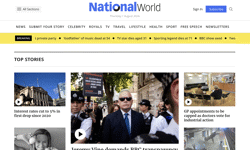As reported by Josh Halliday and Lisa O'Carroll at Guardian.co.uk yesterday: Trinity Mirror, the publisher of the Daily Mirror and 140 regional newspapers, said Bailey would step down at the end of the year, in a statement to the London Stock Exchange late on Thursday.
Bailey has faced a growing shareholder revolt over her £1.7m pay package in a period when the publisher has shed jobs across the UK.
Bailey said in a statement: "For the past 10 years I have had the privilege of being CEO of Trinity Mirror plc, a fascinating and all-consuming role. Newspapers are a business like no other.
"Now I feel the time has come to hand over to someone else to take up the challenge and for me to seek new challenges and opportunities elsewhere."
Trinity Mirror directors held an emergency board meeting on Thursday afternoon over Bailey's departure, according to Sky News.
Criticism over Bailey's remuneration resurfaced on Thursday when the Financial Times reported that leading shareholders had pressed the Trinity Mirror board to reduce her pay package.
Shareholders owning up to a quarter of Trinity Mirror's shares had reportedly threatened to vote against key board members at the publisher's annual general meeting next week.
Trinity Mirror attempted to placate investors in April with a new pay deal for Bailey that reduced her remuneration by about £500,000, but that failed to satisfy some major shareholders.
The company reported a 40% fall in pre-tax profits to £74m for 2011 in its most recent financial results in March. Total revenues for Trinity Mirror fell by 2% to £746m.
In a statement to the London stock exchange, Trinity Mirror said Bailey had ensured the company delivered robust profits through the worst and longest economic downturn in UK history.
Trinity Mirror said it would now begin the search for her successor. Sir Ian Gibson, chairman of Trinity Mirror, said in the statement: "The company and the board are grateful to Sly for her immense contribution and leadership over an extended period and wish her well for the future."
Bailey's departure was announced after trading hours on the London Stock Exchange. Trinity Mirror's share price has plummeted 90% since 2002 when Bailey took over as chief executive, to 32.25p on Thursday.
Bailey's departure is understood to have been prompted by a dispute over her pay. David Grigson, a former chief finance officer at Emap and Reuters who joined the Trinity Mirror board as a non-executive director in January and is due to replace Gibson as chairman in August, is said to have played a key role.
One of the top priorities for Grigson and Bailey's replacement will be dealing with the company's pension deficit. Bailey's departure also prompted speculation that Trinity Mirror may look to offload its regional papers.
In an internal email to staff announcing her departure, Bailey said: "As you all know newspaper are a business like no other and it's been an absolute privilege to have lead our company for the past 10 years, a fascinating and all consuming role."
She added that she planned to "visit each of our businesses so I will have plenty of time to say goodbye" before the end of the year.
However, according to Trinity Mirror insiders, Bailey's internal message was met with "guffaws and whoops of laughter" by staff in the newsroom of national titles the Daily Mirror and Sunday Mirror.
One insider said: "The only time we have ever seen Sly in the newsrooms is when her Net a Porter bags arrive. She comes to the newsroom about once a year but other than that we don't see her for dust." Another said: "Unless you bump into her in a lift, you never see her."
In January Trinity Mirror announced it was to cut up to 75 jobs at its three national newspapers, the Daily Mirror, Sunday Mirror and the People. The latest cuts mean the the company will have slashed editorial staff on the three titles by nearly 40% in the last two years – in June 2010 it axed about 140 full-time posts from 554. After the latest round of cuts the headcount will be down to about 340.
When Trinity Mirror announced its 2011 results in April, it revealed that it had agreed to cut pension fund payments by almost £70m as the publisher's pension deficit had ballooned by almost half.
The publisher revealed that it has reached a deal with the trustees of Trinity Mirror's Pension Schemes to reduce payments for the next three years to £10m per annum, reverting back to normal annual payments of £33m from 2015.
Trinity Mirror blamed the falling stock market and lower discount rates for its pension deficit growing by a further £55m last year to £172.6m at 31 December. The deficit was £30m lower at the end of February 2012.
Trinity Mirror said it was not paying a dividend and will not until there is "clear evidence" the economy is sustainably growing and there is improved visibility and year-on-year stability in ad revenues. In addition, Trinity has promised the pension trustees that if a dividend were to be paid it would have to be financially matched with an additional pension payment.
This led analysts at Citi to conclude that no dividend will be paid until after 2014, following the conclusion of the reduced pension payment deal with trustees.
Bailey joined Trinity Mirror from IPC Media, after heading the magazine publisher for three years.
In a rare public appearance in January, she spoke of the "intense" challenges facing Trinity Mirror and the wider newspaper industry in evidence to the Leveson inquiry into press ethics.
She said of the economic challenges: "It's almost like a falling knife that's been getting sharper on the way down as we have gone through the cycle and we're bumping along the bottom but it's yet to improve."
Trinity Mirror has scaled back its regional publishing operation since 2006, from about 240 titles to 140, after a collapse in advertising and increased competition from the internet. The pace of the cutbacks were made stark in January, when Bailey said that Trinity Mirror had closed 20 of its regional titles in the few weeks since she had submitted her witness statement to the Leveson inquiry.
Bailey told the inquiry that the company had been hit particularly hard by a decline in recruitment advertising. "At the peak, we had around £150m recruitment advertising supporting our titles, and last year we had less than £20m," she said. "And when you're facing that happening to a business, then you have to reduce your costs effectively and quickly to ensure that you have a business and that you can come out the other side of that."










